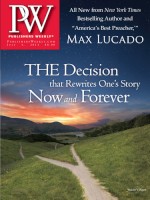For his new book, We Others: New and Selected Stories, Millhauser selects from three decades of work, revealing that some obsessions never go away.
We Others seems a perfect title for this book as five of seven new stories adopt the collective voice or point of view.
What's fascinating about "we" is that it invites conflict. There's nothing innocent about "we"—it implies a not-we who... must be dealt with. Sometimes the not-we is a stranger, like my knife thrower, who enters a community and causes trouble; sometimes it's a hostile group, like the corporation in "The Next Thing" that wants to take over the town. And there's another crucial thing about using a collective narrator—it's uncommon. It's liberating. If you read a story with an "I" or a "he" or a "she," you're in familiar territory—but "we" is mostly unexplored. I think of "we" as an adventure.
In stories both old and new there's a rift between real life and imagination. At the same time there's an embrace of the cliché that the familiar has taken over to become the only possibility.
We embrace clichés because they're familiar and therefore comforting. Nothing can...jolt you awake. There's a kind of art—a false kind—that exists to support this way of experiencing the world. I'd argue that the purpose of art is exactly the opposite: to smash through the familiar, to show you what's really there. The rift isn't between the real and the imaginary—it's between the real and whatever conceals it.
In your earliest work here, stories that aren't entirely fantastical seem to be tethered to the real world—and to realism—in a way that new work isn't. Have you actively tried to break ties to realism?
Strange as this may sound, I consider myself a realist. Or let's say, I've always had a complicated relation to so-called realism. What I dislike is conventional realism—a system of gestures, descriptions, psychological revelations that was once a vital way of representing the world, but has become hackneyed through endless repetition. I'd argue that a conventional realist isn't a realist at all, but a falsifier of the real. The "fantastic" has no interest for me in itself. Its justification is that it's a way of getting at something real—something that can't be gotten at in any other way. In this sense, I'd say that I've never broken my tie to realism. As a reader, I revere the classic realists, writers like Maupassant and Chekhov and, yes, early Hemingway and his American descendants, right up to the present day. My argument isn't with realism—it's with what passes for realism and is actually unrealism.
Did you learn anything going through work that spans 30 years?
One thing I learned is that the park by the river in a recent story, "Getting Closer," is the same park by the river that appears for a moment near the end of "The Eighth Voyage of Sinbad," a story first published 23 years earlier. This echo at first irritated me, then pleased me deeply.



 Volume 258
Issue 27
07/04/2011
Volume 258
Issue 27
07/04/2011





